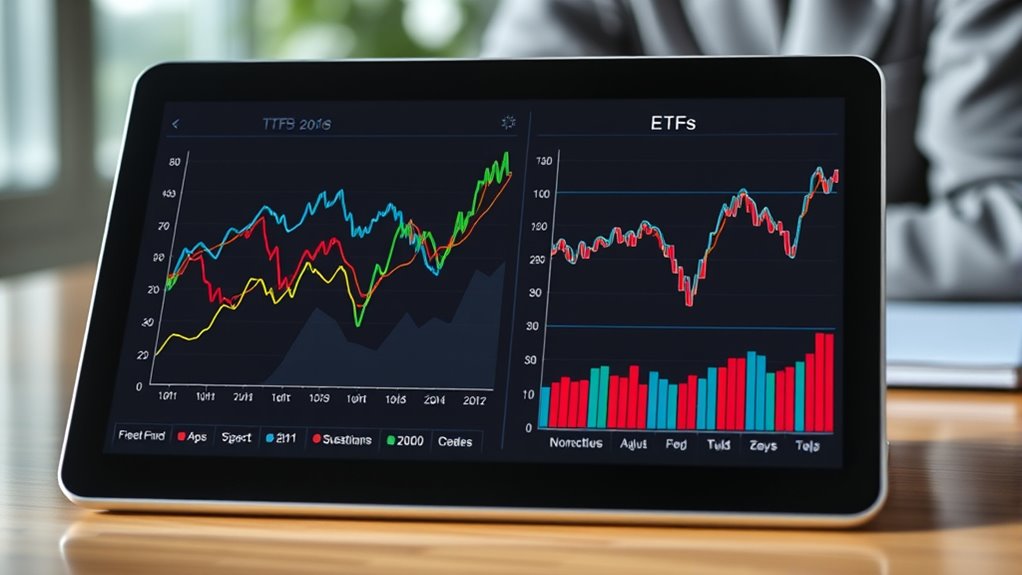Choosing between mutual funds and ETFs depends on your goals, trading style, and tax situation. Mutual funds are good if you prefer a hands-off, professionally managed approach and don’t mind trading once a day. ETFs offer flexibility for intraday trading, lower costs, and better tax efficiency. Consider how active you want your management to be and your comfort with trading options. To make an informed decision, explore these differences further.
Key Takeaways
- Mutual funds are bought and sold once daily at NAV, while ETFs trade throughout the day on stock exchanges.
- ETFs typically have lower expense ratios and are more tax-efficient than mutual funds.
- Mutual funds often offer active management, suitable for hands-off investors, whereas ETFs usually track passive indexes.
- ETFs provide intraday trading flexibility, limit orders, and short-selling options, unlike mutual funds.
- The choice depends on your trading preferences, cost sensitivity, management style, and tax considerations.

When choosing between mutual funds and ETFs, understanding their key differences can help you make smarter investment decisions. Both options pool your money with other investors to buy a diversified mix of assets, but they operate differently when it comes to execution, costs, and how they fit into your overall investment strategies. Recognizing these distinctions can influence how you approach your portfolio and the potential tax implications each investment type carries.
Mutual funds are actively managed or passively managed pools of investments, where you buy or sell shares at the end of the trading day at the net asset value (NAV). This means your transactions are executed once daily, based on the fund’s closing price. If you prefer a more hands-off approach and want a professional to select your investments, mutual funds might fit your investment strategies well. However, it’s important to note that mutual funds often come with higher expense ratios due to active management fees, which can eat into your returns over time.
Mutual funds are bought or sold once daily at the NAV, ideal for hands-off investors.
ETFs, or exchange-traded funds, are traded throughout the day on stock exchanges, just like individual stocks. This intraday trading ability allows you to react quickly to market changes or implement specific investment strategies, such as short-selling or setting limit orders. If your investment approach involves timing the market or actively managing your positions, ETFs provide the flexibility you need. They usually have lower expense ratios than mutual funds, making them a cost-effective choice for many investors. Additionally, ETFs often utilize fund structures that contribute to their tax efficiency.
When it comes to tax implications, ETFs often have an advantage because of their unique structure. ETFs typically use an “in-kind” redemption process that helps limit capital gains distributions. This means you’re less likely to face unexpected tax bills, especially compared to mutual funds, which might distribute capital gains more frequently due to the fund’s trading activity. If minimizing taxes is a priority, ETFs can be a smarter choice, particularly for investors in higher tax brackets or those seeking to optimize their tax strategies.
Ultimately, your decision should align with your investment goals, risk tolerance, and preferences for managing your portfolio. If you prefer a set-it-and-forget-it approach with professional management, mutual funds could be suitable. But if you want more control over your trades, lower costs, and better tax efficiency, ETFs might be the better fit. By understanding these key differences—especially around investment strategies and tax implications—you can make well-informed choices that support your financial future.
Frequently Asked Questions
Can I Switch Between Mutual Funds and ETFS Easily?
Yes, you can switch between mutual funds and ETFs, but consider liquidity concerns and investment flexibility. ETFs trade like stocks, allowing you to buy or sell anytime during market hours, making them more flexible. Mutual funds, however, only settle at the end of the trading day. So, if quick access and liquidity matter to you, shifting between them is feasible, but understand the differences in transaction timing and costs.
Which Offers Better Tax Efficiency, Mutual Funds or ETFS?
ETFs generally offer better tax efficiency than mutual funds because you can buy and sell ETF shares without triggering capital gains within the fund. Mutual funds often distribute capital gains when the fund manager buys or sells assets, which you may have to pay taxes on, even if you didn’t sell your shares. If minimizing capital gains taxes is a priority, ETFs are typically the smarter choice for your investment strategy.
Are There Minimum Investment Amounts for ETFS?
ETFs generally don’t have minimum investment amounts, making them accessible for most investors. You can buy as little as one share, which means there are usually no buying restrictions based on minimum investment. However, some brokerages might set their own minimums for trading or account setups. This flexibility allows you to start investing with smaller amounts and avoid the higher investment minimums often associated with mutual funds.
How Do Expense Ratios Compare Between Mutual Funds and ETFS?
The expense comparison between mutual funds and ETFs is striking—ETFs typically boast much lower expense ratios, saving you a fortune in fees. Their fee structures are more transparent, often with no load fees or minimum investments. Mutual funds tend to have higher expense ratios due to active management and sales loads. If minimizing costs is your priority, ETFs are usually the smarter choice, offering a leaner, more cost-effective investment option.
Do Mutual Funds or ETFS Provide Better Diversification?
You’ll find ETFs generally offer better diversification because they often track broad indexes, helping you easily execute your asset allocation and diversify across sectors and asset classes. Mutual funds also provide diversification through professional management, but ETFs offer more flexibility for implementing diverse investment strategies. Depending on your goals, ETFs might let you build a more varied portfolio quickly, making them a strong choice for broad diversification.
Conclusion
Choosing between mutual funds and ETFs is like picking a car for your daily commute—some prefer the comfort and hands-off approach of a sedan, while others want the sporty agility of a convertible. Just like a car, your investment choice depends on your needs and style. Remember, over 60% of investors find that a mix of both helps balance growth and risk. So, test drive both options and see which one feels right for your financial journey.









